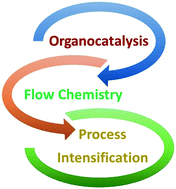Recent advances in continuous-flow organocatalysis for process intensification†
Abstract
Chemistry in continuous-flow continues to attract attention from the community of synthetic organic chemists due to its now well-recognized benefits including, inter alia, quick reaction times, operational safety, rapid reaction screening/optimization, enhanced automation with possible addition of in-line reaction analysis, and easy scalability. Coupling of flow chemistry to enabling technologies (e.g. unconventional solvents, supported reagents or catalysts, microwave irradiation, photochemistry, inductive heating, microreactors) as well as to additive manufacturing (AM) technologies (i.e. 3D printing) gives additional advantages for throughput and automation, and besides this, unique opportunities are offered by compartmentalization, that allows multistep syntheses to occur reconciling incompatible reaction conditions. Based on all this, continuous-flow may itself be seen as an enabling technology which leads in the direction of process intensification meeting increasingly pressing sustainability issues (e.g. waste minimization, cost/energy reduction). As part of flow chemistry, organocatalysis represents an active research area under which there is large opportunity for re-optimizing long-standing reactions or inventing new transformations. Both homogeneous (soluble) and heterogeneous (insoluble) organic molecules have been used as catalysts for continuous-flow processing in either achiral or asymmetric fashion, any issue inherent to a homogeneous approach (high catalyst loading, difficult catalyst separation) being typically overcome with the use of heterogenized organocatalysts. This review is aimed at covering the progresses on organocatalysis in continuous-flow from 2016 to early 2020, with special attention paid to the comparison between batch and flow processes for each discussed transformation to substantiate the potential of flow technology for process intensification.

- This article is part of the themed collection: Sustainable Laboratories


 Please wait while we load your content...
Please wait while we load your content...